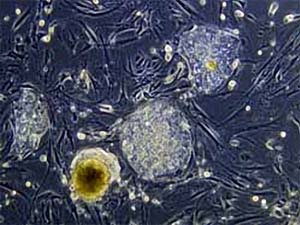Producing insulin from stem cells to treat diabetes
British and American scientists say they can use blood-derived stem cells in the umbilical cord of babies to help patients with type 1 diabetes restore their body's ability to produce insulin. This study is considered an important breakthrough in the application of stem cells, opening up great hope for type 1 diabetics.

Photo of human embryonic stem cells
(Photo: News.wisc.edu)
According to a report released on May 26, 2007, experts said that after four years of research, this is the first time they have been able to develop a large number of stem cells from umbilical cord blood and use them. to replace damaged insulin-producing cells in the pancreas of diabetics.
The team used umbilical cord because it was a special place that contained many new stem cells of human embryos, and the umbilical cord was also easily provided by women who gave birth by opening the uterus to diseases. Institute of the University of Texas School of Medicine.
"This is the first demonstration that stem cells from human umbilical cord can be used to synthesize insulin." This research has just been published in the medical journal Cell Proliferation, June 2007 edition.
Dr. Randall Urban, a member of the research team and professor of internal medicine at the University of Texas, said: 'This discovery gives us the potential for producing insulin from adult stem cells. to treat diabetics'.
According to the lead researcher, Professor Larry Denner, a professor of endocrinology and endocrinology at the University of Texas, " umbilical cord stem cells are capable of producing a compound called C-peptide, a substance The precursor protein of insulin and is only present when the cell produces insulin , so the presence of C-pep proves that at least there is a certain amount of insulin produced by stem cells that is substituted for The pancreas cells were damaged or destroyed '.
According to him, 'our prerequisite for insulin production is the presence of C-peptide'.

British and American scientists say they have produced insulin from newborn umbilical cord stem cells to treat diabetes.(Photo: Neonet.ch)
The team said they hoped to create new pancreatic tissues for diabetics. In people with type 1 diabetes, their bodies are no longer able to produce insulin because those cells have been destroyed.
According to Dr. Denner, scientists are trying to create a new field of renewable medicine, in which stem cells taken from the patient's blood will be fed and modified in the laboratory to replace the cells. Blood or damaged tissues.
In this way, in the transplantation of cells and organs, doctors will avoid the biggest difficulty, which is the rejection of the muscle - a condition that must be avoided, the grafted person must taking immunosuppressants for life.
In this study report, experts also hope that in the future, they will produce a means to replace stem cells from human embryos - a problem that is currently controversial. gender.
In the United States, Congress is debating whether to increase the federal budget for stem cell research. But opponents of stem cells say that human embryo testing is a mistake, while supporters say it is necessary to make positive changes in many areas of medicine. different.
Minh Quang
- People with type 1 diabetes may give up insulin injections because of this study
- Treatment for diabetes with drugs
- Detection of hormones that treat diabetes
- Developing artificial cells can help treat diabetes
- Type 1 diabetes is completely cured without insulin
- America successfully recreates bones from stem cells
- Treat insulin diabetes from lettuce
- Invention helps people with diabetes do not need to pay attention to regular insulin injections
- History of nearly 100 of insulin - the source of life for people with diabetes
- Canada first tested for diabetes with stem cells
- Pig cells can heal diabetes
- Australian scientist discovers the secret of insulin
 Green tea cleans teeth better than mouthwash?
Green tea cleans teeth better than mouthwash? Death kiss: This is why you should not let anyone kiss your baby's lips
Death kiss: This is why you should not let anyone kiss your baby's lips What is salmonellosis?
What is salmonellosis? Caution should be exercised when using aloe vera through eating and drinking
Caution should be exercised when using aloe vera through eating and drinking